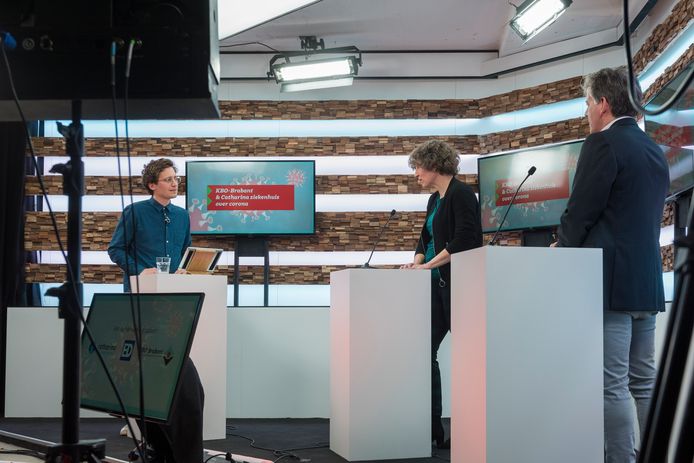QUESTION HOURNow that the world is under the spell of the corona virus, there is a great need for clarification and expertise. In collaboration with the KBO Brabant elderly association, we broadcast a live conversation on Monday evening in which infectiologist Heidi Ammerlaan (Catharina Hospital in Eindhoven), virologist Ab Osterhaus, Ciska Scheidel (director of public health, Ministry of Health, Welfare and Sport) and journalist Chris van Mersbergen answered questions from our readers.
–
In this article, we look back at the most frequently asked questions and the answers of the experts.
–
What does the vaccine actually do?
Heidi Ammerlaan: “When we talk about the mRNA vaccine, such as that of Moderna and Pfizer, it contains a small piece of genetic material, in a capsule of fat globules. This is absorbed into the body after you receive an injection. Your body will produce antibodies against it. This means that the next time your body encounters the virus, the body’s immune response is immediately activated and prevents you from actually becoming ill. ”
–
When is it my turn for the vaccine?
Ciska Scheidel: ,, We are gradually going to vaccinate everyone in this quarter and the next quarter. If you want to know exactly how, you can see when it is your turn on www.coronavaccinatie.nl. That schedule changes a little sometimes because we depend on the vaccines we have. Everyone will eventually receive a letter stating where he or she is going to be pricked. So be sure to wait for that letter, because it clearly states it. ”
–
Is it true that people who have gotten an injection get more freedom?
Ciska Scheidel: “We will first really have to stick to the measures we have now. This vaccine, as we know it today, we know at least that it protects against the disease. We do not yet know exactly whether it works against infectiousness. They are still researching that. “
–
,, The minister has said very clearly that he does not want to distinguish between groups that are and are not vaccinated, but he has also indicated: ‘On the basis of questions from the House of Representatives, I am being advised by the Health Council about this and that we still await advice. Because there are really a number of ethical issues involved. ”
–
Can you still get corona after getting the vaccination?
Heidi Ammerlaan: “Yes, that is possible. The effectiveness of the vaccine is very high, really unbelievable compared to other vaccinations. Seven days after the two vaccines on day zero and on days twenty-one to twenty-eight, the effectiveness of the vaccine is ninety-five percent. That means that if you compare a group of people who have had the vaccine versus people who have not had it, the group that did have the vaccine is ninety-five percent less likely to get sick after exposure. Anyway, ninety-five percent is not a hundred percent, so that means you have a chance of getting corona. ”
–
Text continues below photo.
–
–
Is a vaccine that has been developed so quickly reliable?
Ab Osterhaus: “If you look at how long it normally takes to develop a vaccine, it takes about ten years. Because each step is so terribly expensive, you usually have to wait for the previous step before you can continue. ”
–
“The whole procedure has now been shortened enormously. You take a huge financial risk. We have now all said of this: we do. We are going for this accelerated procedure, but we do not compromise on safety. I dare say that the procedure that has now been followed for the vaccines that are now being used is no different from the normal procedure and that we will only be able to see the whole long-term effects in the longer term. But: that is the case with every procedure. ”
–
Why is there no 24/7 vaccination?
Ab Osterhaus: “As far as I am concerned, it cannot be fast enough. I think we should use everything. All people who can vaccinate properly: deploy. ”
–
“We have started to vaccinate vulnerable people. I totally agree, that’s a really good thing. But: we now know about this new variant. The vaccination we are doing now will not help stem the spread of the virus. The people of 20, 30, 40 years old: these are the people who spread the virus the most. There (vaccinate, ed.) we are not starting yet, rightly so, but I think we will only continue to check the matter when we get to it. ”
–
What is the basis for the coronavirus mutations?
Heidi Ammerlaan: ,, Viruses continuously mutate. That is a characteristic of a virus, which is not surprising. What is important is to continuously monitor whether the mutation is not such that the vaccine is no longer effective. That English virus is different. But: so much different that we expect the vaccine to work just as effectively. “
–
When everyone is vaccinated, we drop all corona measures en masse. Or not?
Ab Osterhaus: “Absolutely not. I think all the measures that are in place at the moment should be really tightly enforced. We don’t yet know exactly how well those vaccines protect against spread, so I think those measures should be followed up until further notice. ”
–
Watch our videos from question time about corona with infectiologist Heidi Ammerlaan, virologist Ab Osterhaus and journalist Chris van Mersbergen:
–
–
Free unlimited access to Showbytes? Which can!
Log in or create an account and don’t miss out on the stars.
–
–



